Puerto Rico is a self-governing Caribbean archipelago and island that is an unincorporated territory of the United States, designated as a commonwealth. Situated approximately 1,000 miles southeast of Miami, Florida, it lies between the Dominican Republic and the U.S. Virgin Islands. It comprises the main island and smaller islands like Vieques, Culebra, and Mona. Home to about 3.2 million residents, it is divided into 78 municipalities, with San Juan as its most populous capital. Both Spanish and English are official languages, although Spanish is more commonly used.
1900: Establishment of civil government
In 1900, the Foraker Act established a civil government in Puerto Rico, ending rule by American generals and the Department of War.
1901: Legal Reforms initiated
In 1901, after the U.S. government assumed control of Puerto Rico, it initiated legal reforms resulting in the adoption of codes of criminal law, criminal procedure, and civil procedure modeled after those then in effect in California.
1902: English-only language law
Despite a 1902 English-only language law, Spanish is the only official language of the Commonwealth judiciary system.
March 12, 1903: University of Puerto Rico Founded
On March 12, 1903, the University of Puerto Rico was officially founded, branching out from the "Escuela Normal Industrial".
1906: U.S. Constitution applies within Puerto Rico
In 1906, the U.S. Supreme Court ruling, Ortega v. Lara, affirmed that the U.S. Constitution applied within Puerto Rico's territory.
1907: Paoli Records Opera
In 1907, Antonio Paoli became the first operatic artist to record an entire opera, Pagliacci by Ruggiero Leoncavallo, in Milan, Italy.
1917: U.S. citizenship granted to Puerto Ricans
In 1917, Puerto Ricans became U.S. citizens, allowing free movement between the island and the mainland, although they remain disenfranchised from federal elections and generally do not pay federal income tax.
1917: U.S. citizenship via Jones–Shafroth Act
In 1917, Puerto Ricans were collectively made U.S. citizens as a result of the Jones–Shafroth Act.
1917: Puerto Ricans made U.S. citizens
In 1917, the Jones Act made Puerto Ricans U.S. citizens.
1917: Inclusion in U.S. compulsory draft
Since 1917, Puerto Ricans have been included in the U.S. compulsory draft when it has been in effect.
October 11, 1918: San Fermín earthquake
On October 11, 1918, the San Fermín earthquake, with an estimated magnitude of 7.5 on the Richter scale, struck off the coast of Aguadilla and was accompanied by a tsunami.
1920: Ponce Creole Architecture
By 1920, the Ponce Creole architectural style was developing predominantly in residential homes in Ponce, Puerto Rico.
1920: Merchant Marine Act
One of the most cited contributors to the high cost of living in Puerto Rico is the Merchant Marine Act of 1920, also known as the Jones Act, which prevents foreign-flagged ships from carrying cargo between two American ports.
1920: Mention of the Jones Act
The 2018 study by Reeve & Associates and Estudios Tecnicos concluded that the 1920 Jones Act had no impact on retail prices or the cost of living in Puerto Rico.
September 1928: Lake Okeechobee Hurricane (San Felipe Segundo)
In September 1928, the Lake Okeechobee Hurricane, also known as the San Felipe Segundo hurricane, made landfall in Puerto Rico as a Category 5 hurricane.
1930: Baloncesto Superior Nacional Beginning
In 1930 Baloncesto Superior Nacional began as top-level professional basketball league in Puerto Rico.
1931: Name changed back to Puerto Rico
In 1931, the name of the island was officially changed back to Puerto Rico through a joint resolution in Congress, introduced by Félix Córdova Dávila.
1937: Insular Territories Stamp
In 1937, Puerto Rico was commemorated on a U.S. postal stamp as part of the Insular Territories series, featuring 'La Fortaleza'.
1940: Founding of the Mita Congregation
In 1940, Juanita García Peraza founded the Mita Congregation, the first religion of Puerto Rican origin.
1943: Report by Irene Barnes Taeuber
In 1943, Irene Barnes Taeuber, an American demographer, released a report stating that some of the data from censuses of Puerto Rico completed by Spain between 1765 and 1857 remained untabulated and were considered unreliable.
May 1, 1945: Law No. 40 designated PRASA's existence
On May 1, 1945, Law No. 40 designated the existence of the Puerto Rico Aqueducts and Sewers Authority (PRASA), also known as AAA.
1948: First Olympic Medal
In 1948, Juan Evangelista Venegas won the first Olympic medal for Puerto Rico in boxing.
April 27, 1949: First Free Election Stamp
On April 27, 1949, a 3-cent stamp commemorated the first free election for governor of Puerto Rico, featuring the inauguration of Luis Muñoz Marín.
1950: Puerto Rico Federal Relations Act
In 1950, the U.S. Congress oversaw Puerto Rico under the Puerto Rico Federal Relations Act.
1951: World Cup of Baseball Gold
In 1951, the Puerto Rico national baseball team won a gold medal at the World Cup of Baseball.
1951: Rio Piedras Annexed to San Juan
In 1951, the former independent municipality of Río Piedras was annexed to San Juan.
July 25, 1952: Adoption of official Spanish name
On July 25, 1952, the official Spanish name, Estado Libre Asociado de Puerto Rico (Free Associated State of Puerto Rico), was adopted by a constitutional assembly, as suggested by Luis Muñoz Marín.
1952: Approval of territorial constitution
In 1952, Congress approved a territorial constitution for Puerto Rico, enabling residents to elect a governor, a senate, and a house of representatives.
1952: Establishment of the first synagogue
In 1952, Sha'are Zedeck, the island's first synagogue, was established by American Jews.
1952: Three main political parties
Since 1952, Puerto Rico has had three main political parties: the Popular Democratic Party (PPD), the New Progressive Party (PNP), and the Puerto Rican Independence Party (PIP).
1957: Joined International Basketball Federation
In 1957, the Puerto Rico national basketball team joined the International Basketball Federation.
1960: Census questionnaire change
Between 1960 and 1990, the census questionnaire in Puerto Rico did not ask about race or ethnicity.
September 12, 1971: San Juan 450th Anniversary Stamp
On September 12, 1971, San Juan, Puerto Rico was commemorated with an 8-cent stamp on its 450th anniversary, featuring a sentry box from Castillo San Felipe del Morro.
1971: Florida Municipality established
The municipality of Florida in Puerto Rico was founded in 1971.
1973: Roberto Clemente Hall of Fame Induction
In 1973, Roberto Clemente was enshrined in the Hall of Fame.
1973: Issuing bonds
The government had already been issuing bonds to balance its actual budget for four decades beginning in 1973.
1979: Pan American Games in San Juan
In 1979, Puerto Rico hosted the Pan American Games, officially in San Juan.
1984: San Juan PPQ station inspections
Between 1984–2000, the San Juan PPQ station recorded 7.74% of all interceptions, #4 in the country, #2 for insects and #3 for pathogens.
1985: Pathogen Interceptions
In 1999–2000, pathogen interceptions were dramatically (17%) higher than in 1985–1986 at San Juan PPQ station.
1986: Pathogen Interceptions
In 1999–2000, pathogen interceptions were dramatically (17%) higher than in 1985–1986 at San Juan PPQ station.
1990: Census questionnaire change
Between 1960 and 1990, the census questionnaire in Puerto Rico did not ask about race or ethnicity.
1991: Autonomous Municipalities Act
Per the Autonomous Municipalities Act of 1991, each municipality has a mayor and a municipal legislature elected for four-year terms.
1992: President Bush's memorandum on administrative relationship
In 1992, President George H.W. Bush issued a memorandum directing federal departments and agencies to treat Puerto Rico administratively as a state, as long as it did not disrupt federal programs or operations.
1992: FBI makes armed carjacking a federal crime
In 1992, the FBI made armed carjacking a federal crime and rates decreased per statistics.
1993: Central American and Caribbean Games in Ponce
In 1993, the Central American and Caribbean Games were hosted in Ponce, Puerto Rico.
1993: U.S. Atlantic Command
In 1993, the U.S. Atlantic Command (LANTCOM), which had authority over all U.S. military operations that took place throughout the Atlantic, changed to USACOM. Puerto Rico was seen as crucial in supporting LANTCOM's mission.
1994: Goodwill Games Gold Medal
In 1994, the Puerto Rico national basketball team won gold at the Goodwill Games.
1997: Assessment of Protestants
In 1997, a researcher gave a more conservative assessment of the proportion of Protestants, finding a Protestant population of approximately 33 to 38 percent.
1998: Endemic species count
As of 1998, the number of species endemic to the Puerto Rico archipelago was recognized as 239 plants, 16 birds and 39 amphibians/reptiles.
1998: Pablo Ramos poll on religion
In 1998, pollster Pablo Ramos stated that the population was 38 percent Catholic, 28 percent Pentecostal, and 18 percent independent churches.
1999: Orlando Cepeda Hall of Fame Induction
In 1999, Orlando Cepeda was enshrined in the Hall of Fame.
1999: Renaming of U.S. Atlantic Command
In 1999, U.S. Atlantic Command was renamed and given a new mission as U.S. Joint Forces Command. Puerto Rico is currently under the responsibility of U.S. Northern Command.
1999: Pathogen Interceptions
In 1999–2000, pathogen interceptions were dramatically (17%) higher than in 1985–1986 at San Juan PPQ station.
2000: Education Attainment
According to the 2000 Census, 60.0% of the population attained a high school degree or higher, and 18.3% had a bachelor's degree or higher.
2000: San Juan PPQ station inspections
Between 1984–2000, the San Juan PPQ station recorded 7.74% of all interceptions, #4 in the country, #2 for insects and #3 for pathogens.
2000: Population peak
In 2000, the population of Puerto Rico peaked at 3,808,610.
2000: Racial self-identification question included in census
The 2000 United States census included a racial self-identification question in Puerto Rico, with most Puerto Ricans identifying as white and Latino.
2000: Initial count of American Indian or Alaskan Native
The 2010 census count of "American Indian or Alaskan Native" increased almost 49 percent from the 2000 count.
2000: Structural deficit
The practice of approving budgets with a structural deficit has been done for 25 consecutive years starting in 2000.
2002: Literacy Rate
In 2002, the literacy rate of the Puerto Rican population was 94.1%, with 93.9% for males and 94.4% for females.
2003: Montreal Expos in San Juan
In 2003, San Juan hosted the Montreal Expos for several series.
2003: University of Puerto Rico genetic study
In 2003, a study by the University of Puerto Rico found that 61.1 percent of those surveyed had mitochondrial DNA of Indigenous origin.
August 8, 2004: Defeat of United States in Olympics
On August 8, 2004, the Puerto Rico national basketball team defeated the United States 92-73 in an Olympic tournament for the first time since the integration of NBA players.
2004: Montreal Expos in San Juan
In 2004, San Juan hosted the Montreal Expos for several series before they moved to Washington, D.C.
March 2006: World Baseball Classic in San Juan
In March 2006, San Juan's Hiram Bithorn Stadium hosted the opening and second rounds of the World Baseball Classic.
2006: Start of recession
Puerto Rico experienced a recession from 2006 to 2011, interrupted by four quarters of economic growth.
2007: Telecommunications data
As of 2007, Puerto Rico had 30 TV stations, 125 radio stations, and approximately 1 million TV sets.
2007: Puerto Ricans for Puerto Rico Party registered
In 2007, the Puerto Ricans for Puerto Rico Party was registered, seeking to address the islands' problems from a status-neutral platform.
2007: Muslim population
In 2007, there were about 5,000 Muslims in Puerto Rico, representing about 0.13% of the population.
2008: Puerto Ricans for Puerto Rico Party fails to obtain votes
In 2008, the Puerto Ricans for Puerto Rico Party ceased to be registered after failing to obtain the required number of votes.
2008: Puerto Rico Soccer League Established
In 2008, the Puerto Rico Soccer League, the archipelago's first unified league, was established.
2008: Flags of our nation series
In the "Flags of our nation series" from 2008 to 2012, five territorial flags were featured.
2009: Payments to U.S. Treasury
In 2009, Puerto Rico paid $3.742 billion into the U.S. Treasury. While residents pay into Social Security and are eligible for benefits, they are excluded from Supplemental Security Income and receive less Medicaid funding than a U.S. state would. Medicare providers also receive lower reimbursements for services in Puerto Rico, despite full contributions to the system in 2009.
2009: UN resolution on Puerto Rican self-determination
In 2009, the United Nations Special Committee on Decolonization approved a draft resolution urging the U.S. government to expedite a process allowing the Puerto Rican people to exercise their right to self-determination and independence.
2010: School Statistics
As of 2010, there were 1539 public schools and 806 private schools in Puerto Rico.
2010: 2010 Census data tabulation
By July 1, 2019, according to an estimate by the U.S. Census Bureau, the population of Puerto Rico had declined by 532,095 people since the 2010 Census data had been tabulated.
2010: Orthodox Christian population
In 2010, Orthodox Christians accounted for one percent of the population in Puerto Rico.
2010: Racial identification
In 2010, only 3 percent of the population of Puerto Rico identified as multiracial.
2010: Central American and Caribbean Games in Mayagüez
In 2010, the Central American and Caribbean Games were hosted in Mayagüez, Puerto Rico.
2010: Life Expectancy
In 2010, the average life expectancy in Puerto Rico was 78.7 years.
2010: 2010 Census
In 2010, the population of Puerto Rico was 3,725,789 according to the census, declining for the first time in census history.
2010: Census count of American Indian or Alaskan Native
In the 2010 census, 19,839 respondents identified as "American Indian or Alaskan Native", an increase of almost 49 percent from 2000 count.
2011: Roberto Alomar Hall of Fame Induction
In 2011, Roberto Alomar was enshrined in the Hall of Fame.
2011: Puerto Rico Flag Forever Stamp
In 2011, a Forever stamp featuring the Puerto Rico Flag illustrated by a bird was issued.
2011: Median home value
In 2011, median home value in Puerto Rico ranged from U.S.$100,000 to U.S.$214,000, while the national median home value was $119,600.
2011: End of recession
Puerto Rico experienced a recession from 2006 to 2011, interrupted by four quarters of economic growth.
November 2012: Referendum on Puerto Rico's status
In November 2012, a referendum took place, with 54% voting against the current territorial status and 61.16% voting for statehood in a subsequent vote on alternate status options.
2012: Pew Research survey on literacy
A Pew Research survey indicated an adult literacy rate of 90.4% in 2012, based on data from the United Nations.
2012: Population decline
In 2012, Puerto Rico's population declined by nearly 1%.
2012: Flags of our nation series
In the "Flags of our nation series" from 2008 to 2012, five territorial flags were featured.
2012: Movimiento Unión Soberanista and Partido del Pueblo Trabajador emergence
The 2012 election saw the emergence of the Movimiento Unión Soberanista and the Partido del Pueblo Trabajador.
2013: Continued population decline
In 2013, Puerto Rico's population declined by an additional 1% (36,000 people) due to a falling birthrate and emigration.
2013: Government Accountability Office report on the Jones Act
In 2013, the Government Accountability Office published a report suggesting that repealing or amending the Jones Act cabotage law might reduce Puerto Rico's shipping costs, as shippers believed opening trade to non-U.S.-flag competition could lower costs. However, the report also noted that the effects of modifying the Jones Act for Puerto Rico remained highly uncertain for both Puerto Rico and the U.S.
2013: Start of recession
Puerto Rico entered into recession again in 2013, following growing fiscal imbalance and the expiration of the IRS Section 936 corporate incentives that the U.S. Internal Revenue Code had applied to Puerto Rico.
March 2014: AP article on Catholic identification
In March 2014, an Associated Press article stated that "more than 70 percent" of Puerto Ricans identified as Catholic.
2014: Congressional Gold Medal for the 65th Infantry Regiment
In 2014, the 65th Infantry Regiment of the U.S. Army, nicknamed The Borinqueneers, was awarded the Congressional Gold Medal for its heroism during the Korean War.
2014: Homicide rate
In 2014, the homicide rate in Puerto Rico was 19.2 per 100,000 inhabitants, significantly higher than any U.S. state, with most victims being gang members and drug traffickers.
2015: Jehovah's Witnesses
In 2015, the 25,832 Jehovah's Witnesses represented about 0.70% of the population, with 324 congregations.
2015: Language legislation
In 2015, the Puerto Rican legislature declared Spanish to be the first official language and English the second official language.
2015: Defaults on debts
The Commonwealth of Puerto Rico had been defaulting on many debts, including bonds, since 2015.
2015: Household income
The household median income is stated as $19,350 and the mean income as $30,463 in the U.S. Census Bureau's 2015 update. The report also indicates that 45.5% of individuals are below the poverty level.
2016: Election of Jenniffer González-Colón
In 2016, Jenniffer González-Colón, a member of the New Progressive Party and the Republican Party, was elected as the resident commissioner of Puerto Rico. She received more votes than any other official elected in Puerto Rico that year.
2016: First Olympic Gold Medal
In 2016, Monica Puig won the first gold medal for Puerto Rico in the Olympic Games, winning the Women's Tennis singles title in Rio.
2016: PROMESA Act signed into law
In 2016, President Barack Obama signed H.R. 5278: PROMESA into law, establishing a Control Board over the Puerto Rican government with significant federal control.
2016: U.S. Supreme Court ruling on double jeopardy
In 2016, the U.S. Supreme Court held that accusing someone of a criminal act at the federal level and then accusing them for the same act in a Commonwealth court would constitute double jeopardy, as Puerto Rico lacks sovereignty separate from Congress as a state does.
July 1, 2017: Potential healthcare crisis
According to a letter sent to Congress by the Secretary of the Treasury and the Secretary of Health and Human Services, without action before April, Puerto Rico's ability to execute contracts for Fiscal Year 2018 with its managed care organizations will be threatened, thereby putting at risk beginning July 1, 2017 the health care of up to 900,000 impoverished U.S. citizens living in Puerto Rico.
July 2017: PREPA power authority bankruptcy
In early July 2017, the PREPA power authority was effectively bankrupt after defaulting in a plan to restructure $9 billion in bond debt; the agency planned to seek Court protection.
August 2017: Financial oversight board plan
In early August 2017, the island's financial oversight board (created by PROMESA) planned to institute two days off without pay per month for government employees, down from the original plan of four days per month. Governor Rossello rejected this plan. Pension reforms were also discussed.
September 7, 2017: Hurricane Irma
On September 7, 2017, Puerto Rico was hit by Category 5 Hurricane Irma, causing significant damage.
September 20, 2017: Hurricane Maria
On September 20, 2017, Puerto Rico was struck by Category 4 Hurricane Maria, resulting in extreme damage, including widespread power outages and infrastructure damage.
2017: Hurricane Maria damage
In 2017, Hurricane Maria caused severe damage to the island of Puerto Rico and its infrastructure, disrupting tourism for many months. The damage was estimated at $100 billion.
2017: Hurricanes Irma and Maria affect Puerto Rico
In 2017, Puerto Rico was affected by Category 5 Hurricane Irma and Category 4 Hurricane Maria, causing widespread and devastating impacts.
2017: First Eastern Catholic Church established
In 2017, the first Eastern Catholic Church was established in Puerto Rico.
2017: Population decline due to hurricanes
In 2017, the impact of hurricanes Maria and Irma led to Puerto Rico's greatest population decline since the U.S. acquired the archipelago.
2017: Referendum in favor of statehood
In 2017, there was another referendum in Puerto Rico, in favor of statehood although it was boycotted by some political opponents of it.
2017: Hospital Count
In 2017, there were 69 hospitals in Puerto Rico.
2017: Puerto Rican government-debt crisis
In early 2017, the Puerto Rican government-debt crisis posed serious problems for the government which was saddled with outstanding bond debt that had climbed to $70 billion. The debt had been increasing during a decade-long recession.
July 20, 2018: Puerto Rico Law 120-2018 signed
On July 20, 2018, Puerto Rico Law 120-2018 (Ley para Transformar el Sistema Eléctrico de Puerto Rico) was signed, authorizing PREPA to sell infrastructure and services to other providers.
2018: Potential healthcare crisis
According to a letter sent to Congress by the Secretary of the Treasury and the Secretary of Health and Human Services, without action before April, Puerto Rico's ability to execute contracts for Fiscal Year 2018 with its managed care organizations will be threatened, thereby putting at risk beginning July 1, 2017 the health care of up to 900,000 impoverished U.S. citizens living in Puerto Rico.
2018: Study on the impact of the Jones Act
In 2018, a study by Reeve & Associates and Estudios Tecnicos concluded that the 1920 Jones Act had no impact on retail prices or the cost of living in Puerto Rico.
2018: Tourism Campaign launched by Discover Puerto Rico
In 2018, a tourism campaign was launched by Discover Puerto Rico intended to highlight the island's culture and history, branding it distinct, and different from other Caribbean destinations.
2018: PREPA's government monopoly ends
In 2018, the Puerto Rico Electric Power Authority (PREPA) lost its government monopoly status, as it was previously the only entity authorized to conduct electric power business in Puerto Rico.
January 1, 2019: Carjackings in Puerto Rico
From January 1, 2019, to March 14, 2019, thirty carjackings had occurred on the island in municipalities like Guaynabo and others.
March 14, 2019: Carjackings in Puerto Rico
From January 1, 2019, to March 14, 2019, thirty carjackings had occurred on the island in municipalities like Guaynabo and others.
April 2019: Tourism recovery after Hurricane Maria
An April 2019 report indicated that only a few hotels were still closed, and that life for tourists in and around the capital had, for the most part, returned to normal after Hurricane Maria.
July 1, 2019: U.S. Census Bureau population estimate
Based on July 1, 2019, estimate by the U.S. Census Bureau, the population of Puerto Rico had declined by 532,095 people since the 2010 Census data had been tabulated.
October 2019: Tourism recovery after Hurricane Maria
By October 2019, nearly all of the popular amenities for tourists, in the major destinations such as San Juan, Ponce and Arecibo, were in operation on the island and tourism was rebounding after Hurricane Maria. Tourism provides up to 10% of Puerto Rico's GDP.
2019: Tourism Campaign planned by Discover Puerto Rico
In 2019, Discover Puerto Rico planned to continue the tourism campaign that was launched in 2018.
January 7, 2020: Largest earthquake since 1918
On January 7, 2020, Puerto Rico experienced its largest earthquake since 1918, estimated at magnitude 6.4, causing over $3.1 billion in economic losses.
June 22, 2020: Contract signed with LUMA Energy
On June 22, 2020, a contract was signed making LUMA Energy the new operator of the energy distribution and transmission infrastructure, partially privatizing the Puerto Rican power grid.
November 3, 2020: Statehood referendum
On November 3, 2020, Puerto Rico held a statehood referendum, with 52% of voters answering yes to the question of immediate admission into the Union as a State.
2020: Puerto Ricans living outside of Puerto Rico in the U.S.
According to the 2020 U.S. census, the number of Puerto Ricans living outside of Puerto Rico in the U.S. is almost twice as many as those living in Puerto Rico.
2020: 2020 United States census
According to the 2020 United States census, Puerto Rico had 3,285,874 residents, marking an 11.8% decrease since 2010.
2020: Gross National Income per capita
According to the World Bank, gross national income per capita in Puerto Rico in 2020 was $21,740.
2020: Hispanic or Latino population
As of 2020, Hispanic or Latinos made up 98.9 percent of the population of Puerto Rico.
2020: Population of San Juan
Based on the 2020 Census, San Juan, the capital of Puerto Rico, had a population of 342,259 people.
June 1, 2021: LUMA Energy takeover
On June 1, 2021, LUMA Energy was set to take over the energy distribution and transmission infrastructure, amidst protests and uncertainty.
2021: Life Expectancy
As of 2021, the average life expectancy in Puerto Rico was approximately 82.1 years.
2022: Estimated evangelical population
A researcher estimated that Puerto Rico would become 75 percent evangelical by 2022.
2022: House passes Puerto Rico Status Act
In 2022, the Puerto Rico Status Act, H.R. 8393, passed the House of Representatives in the United States Congress.
2023: Temple dedication by the Church of Jesus Christ of Latter-day Saints
In 2023, the Church of Jesus Christ of Latter-day Saints dedicated a temple in San Juan, and reported having a membership of approximately 23,000 in the commonwealth.
November 5, 2024: Statehood wins referendum
On November 5, 2024, Statehood won a non-binding referendum with 59%. Also, Jenniffer González-Colón won the office of Governor of Puerto Rico.
November 2024: Last election held
The Governor and legislators are elected by popular vote every four years, with the last election held in November 2024.
Mentioned in this timeline

Basketball is a team sport played on a rectangular court...

Barack Obama the th U S President - was the...

Roberto Clemente was a celebrated Puerto Rican baseball player for...
California is a U S state on the Pacific Coast...

Washington D C is the capital city and federal district...
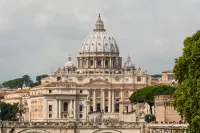
The Catholic Church the largest Christian church globally with over...
Trending
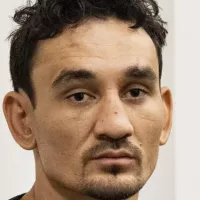
Jerome Max Keli'i Holloway is an American professional mixed martial artist competing in the UFC's Featherweight and Lightweight divisions A...

4 months ago Muratori wins ITA Regional Singles Championship, Gonzalez runner-up in Doubles, Women's Tennis wraps up
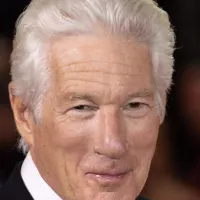
2 months ago Richard Gere and Wife Alejandra Silva Make Rare Red Carpet Appearance in Madrid.
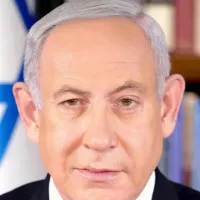
2 months ago Netanyahu Seeks Presidential Pardon Amid Corruption Trial: A Political Maneuver?

2 months ago Olivia Munn Suffered Food Poisoning After Eating Sushi in Bathtub, Vomited at Airport
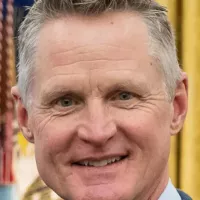
10 months ago Steve Kerr Addresses Jonathan Kuminga's Fit Within the Warriors After OT Loss.
Popular

Thomas Douglas Homan is an American law enforcement officer who...

XXXTentacion born Jahseh Dwayne Ricardo Onfroy was a controversial yet...

William Franklin Graham III commonly known as Franklin Graham is...

Instagram is a photo and video-sharing social networking service owned...

Jupiter is the fifth and largest planet from the Sun...

Martin Luther King Jr was a pivotal leader in the...